VANCOUVER, British Columbia, Dec. 27, 2023 (GLOBE NEWSWIRE) — Li-FT Power Ltd. (“LIFT” or the “Company”) (TSXV: LIFT) (OTCQX: LIFFF) (Frankfurt: WS0) is pleased to report assays from 8 drill holes completed at the BIG East, Echo, Fi Main, Ki, & Shorty pegmatites within the Yellowknife Lithium Project (“YLP”) located outside the city of Yellowknife, Northwest Territories (Figure 1). Drilling has intersected significant intervals of spodumene mineralization, with the following highlights:
Highlights:
- YLP-0115: 28 m at 0.99% Li2O, (BIG East)
including: 8 m at 1.43% Li2O
- YLP-0120: 23 m at 0.61% Li2O, (Echo)
including: 6 m at 1.06% Li2O
- YLP-0111: 11 m at 0.52% Li2O, (Shorty)
including: 2 m at 1.24% Li2O
- YLP-0124: 6 m at 1.07% Li2O, (BIG East)
Discussion of Results
This week’s drill results are for eight holes drilled on five different pegmatite complexes, with two holes each from BIG East (YLP-0115, -0123), Shorty (YLP-0070, -0111), and Fi Main (YLP-0071, -0137) as well as one hole each from Echo (YLP-00120) and Ki (YLP-0118). A table of composite calculations, general comments related to this discussion, and a table of collar headers are provided towards the end of this section.
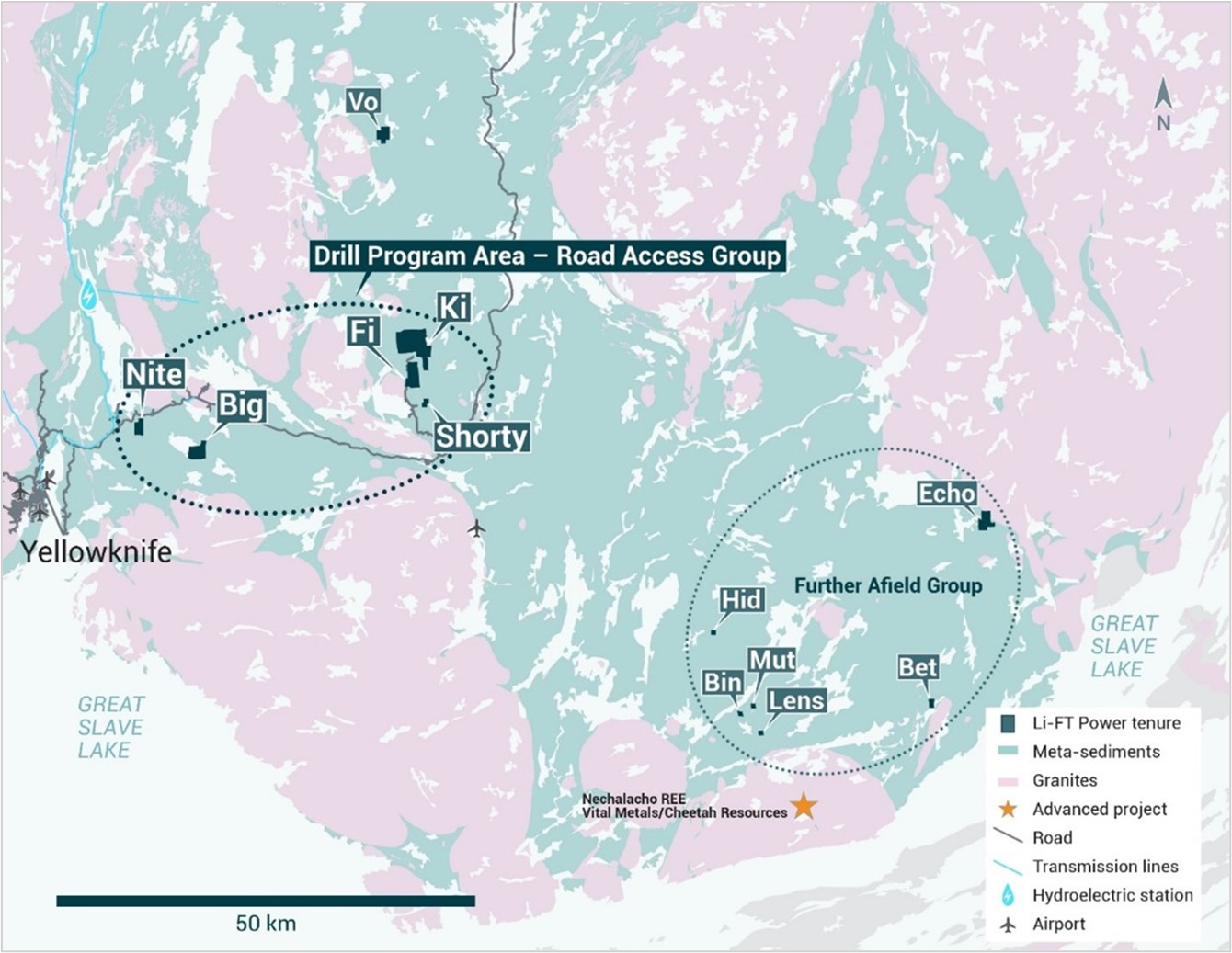
Figure 1 – Location of LIFT’s Yellowknife Lithium Project. Drilling has been thus far focused on the Road Access Group of pegmatites which are located to the east of the city of Yellowknife along a government-maintained paved highway, as well as the Echo target in the Further Afield Group.
BIG East Pegmatite
The BIG East pegmatite complex comprises a corridor of parallel-trending dykes that is exposed for at least 1,300 m of strike length, ranges from 10-100 m wide, and dips approximately 55°-75° degrees to the west. The northern-most ~300-400 m of this corridor is stepped over 300 m to the west to form an en échelon-like array with the southern bulk of the complex.
YLP-0115 was drilled to test the BIG East swarm approximately 600 m from its southern end and 200 m vertically beneath the surface, as well as 50 m downdip of previously released YLP-0092 (combined 25 m of pegmatite averaging 1.73% Li2O), 150 m downdip of YLP-0085 (combined 28 m at 1.19% Li2O), and 200 m downdip of YLP-0084 (combined 20 m at 1.44% Li2O). Drilling intersected a single 31 m wide pegmatite dyke that returned an assay composite of 0.99% Li2O over 28 m, including a subinterval of 1.43% Li2O over 8 m.
YLP-0123 was drilled on northern en-échelon step-out, approximately 100 m from its northern mapped extent, 50 m vertically beneath the surface, and 50-100 m up-dip of previously released YLP-0122 (no pegmatite). Drilling intersected a 9 m wide and 8 m wide pegmatite separated by 17 m of country rock, with the upper one returning a composite of 1.07% Li2O over 6 m (Table 1 and 2, Figures 2 & 3).
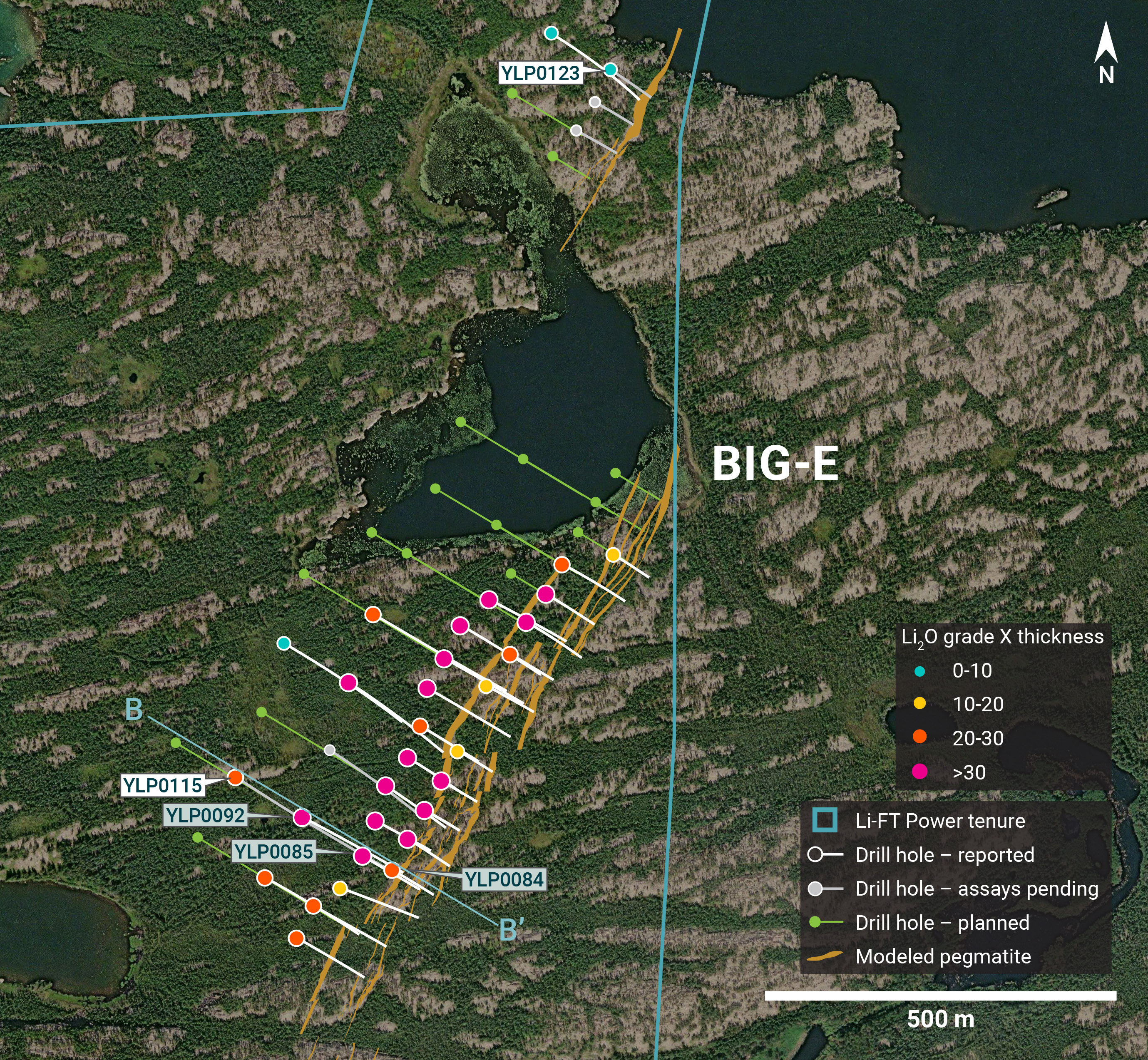
Figure 2 – Plan view showing the surface expression of the BIG East pegmatite with diamond drill holes reported in this press release.
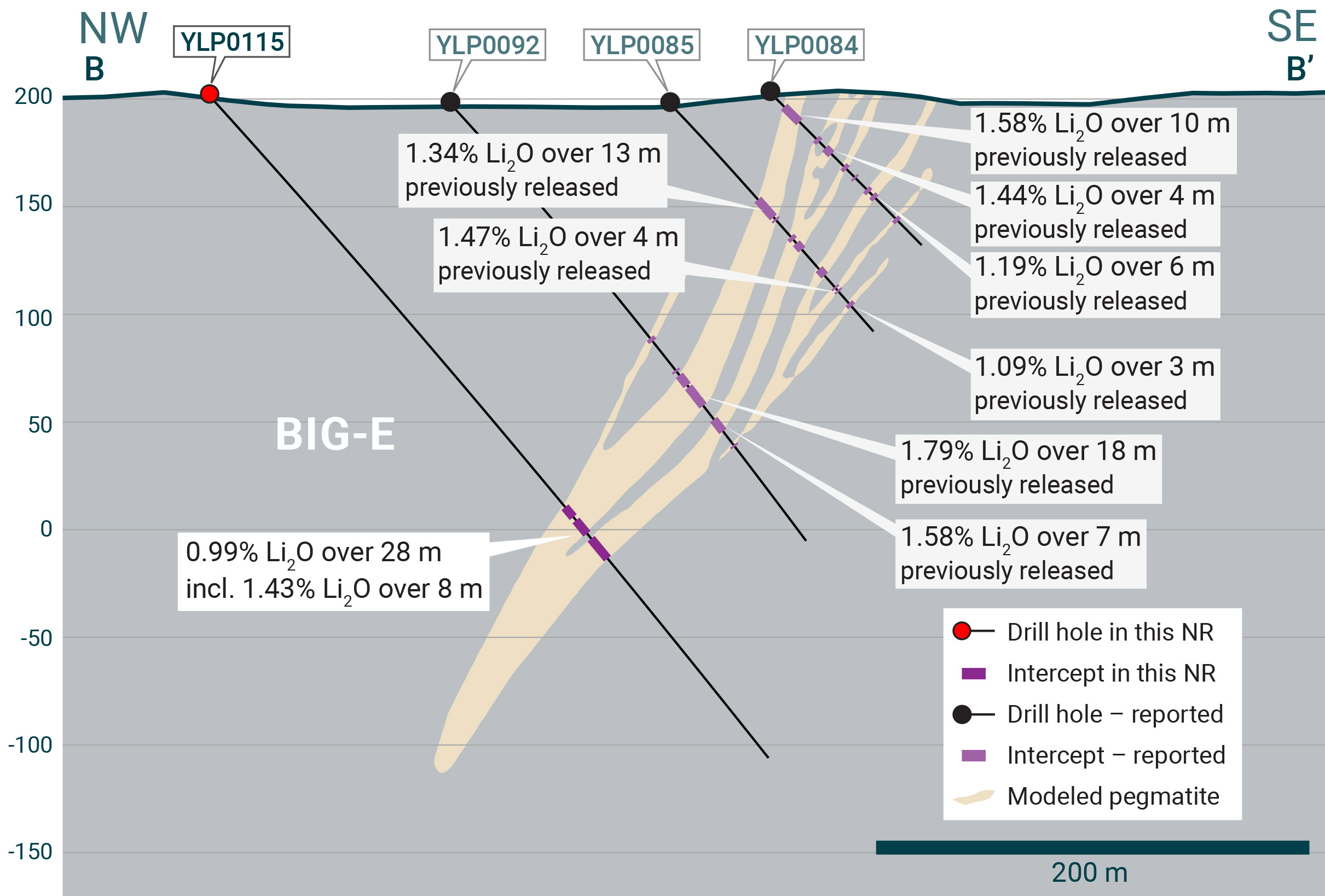
Figure 3 – Cross-section illustrating YLP-0115 with results as shown in the BIG East pegmatite dyke with a 28 m interval of 0.99% Li2O.
Echo Pegmatite
The Echo pegmatite complex comprises a north-northwest trending corridor, at least 1,000 m in length and 450 m in width, with numerous trend-parallel and oblique (mostly northwest-trending) dykes. Individual dykes range from gently to steeply east dipping and are up to 25 m wide. The hole described below was collared into a pegmatite swarm formed by three parallel, oblique-striking, and gently dipping pegmatite intervals (upper, mid, lower) that all merge, to the southeast, into a wider, more northwesterly-striking, and more steeply dipping dyke.
YLP-0120 tested the merged portion of the upper and middle dykes as well as the lower dyke, approximately 100 m from its northern mapped extent and, respectively, <25 m and 100 m vertically beneath the surface. This hole also falls 50 m downdip of previously released YLP-0107 (1.24% Li2O over 13 m from middle pegmatite) and 100 m downdip of YLP-0106 (1.41% Li2O over 10 m from middle). Drilling of YLP-0120 intersected a 29 m wide merged upper-middle dyke that returned an assay composite of 0.61% Li2O over 23 m, including 1.06% Li2O over 6 m, as well as a 3 m wide lower dyke with negligible grade (Table 1 & 2, Figures 4 & 5).
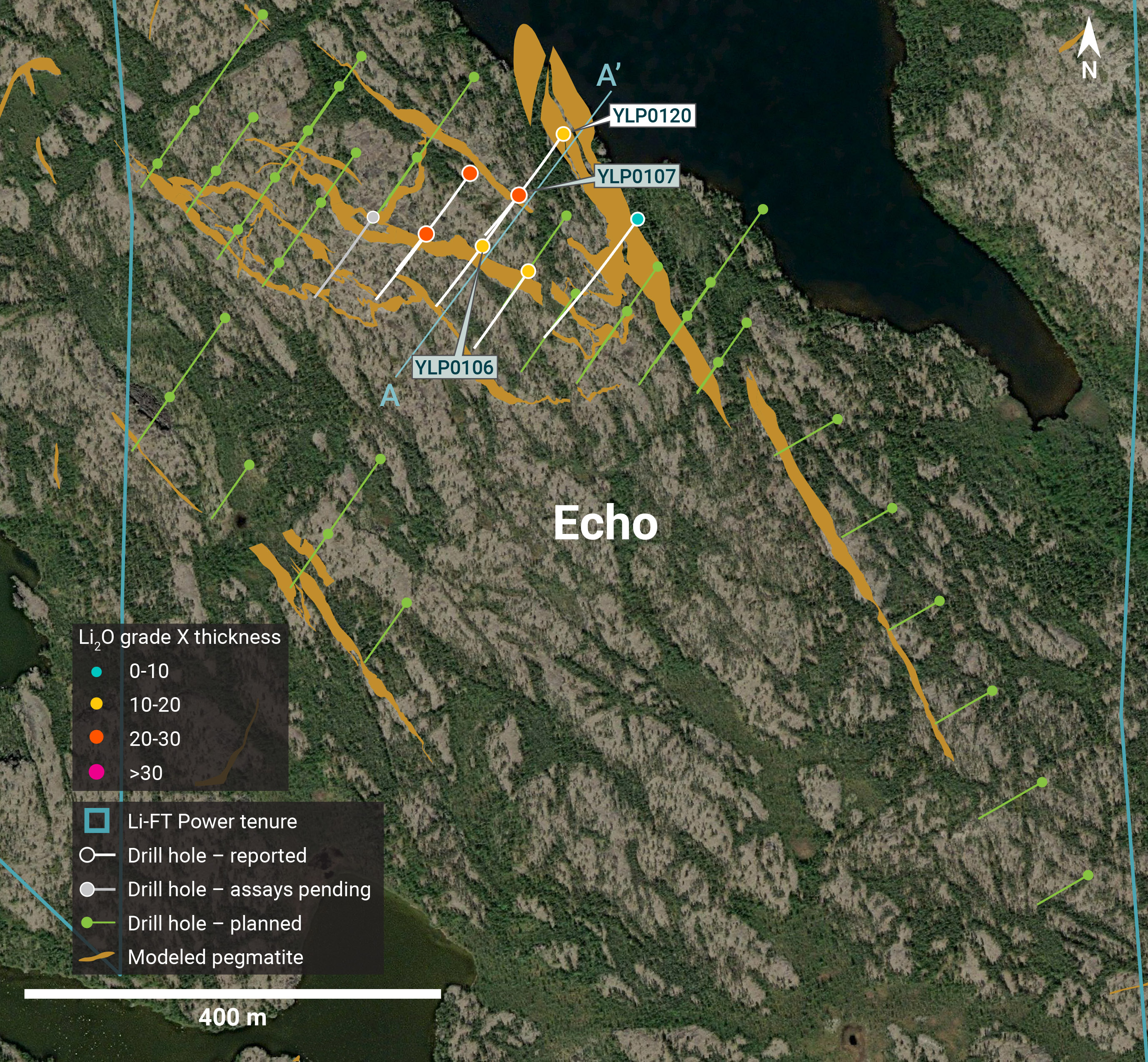
Figure 4 – Plan view showing the surface expression of the Echo pegmatite with diamond drill holes reported in this press release.
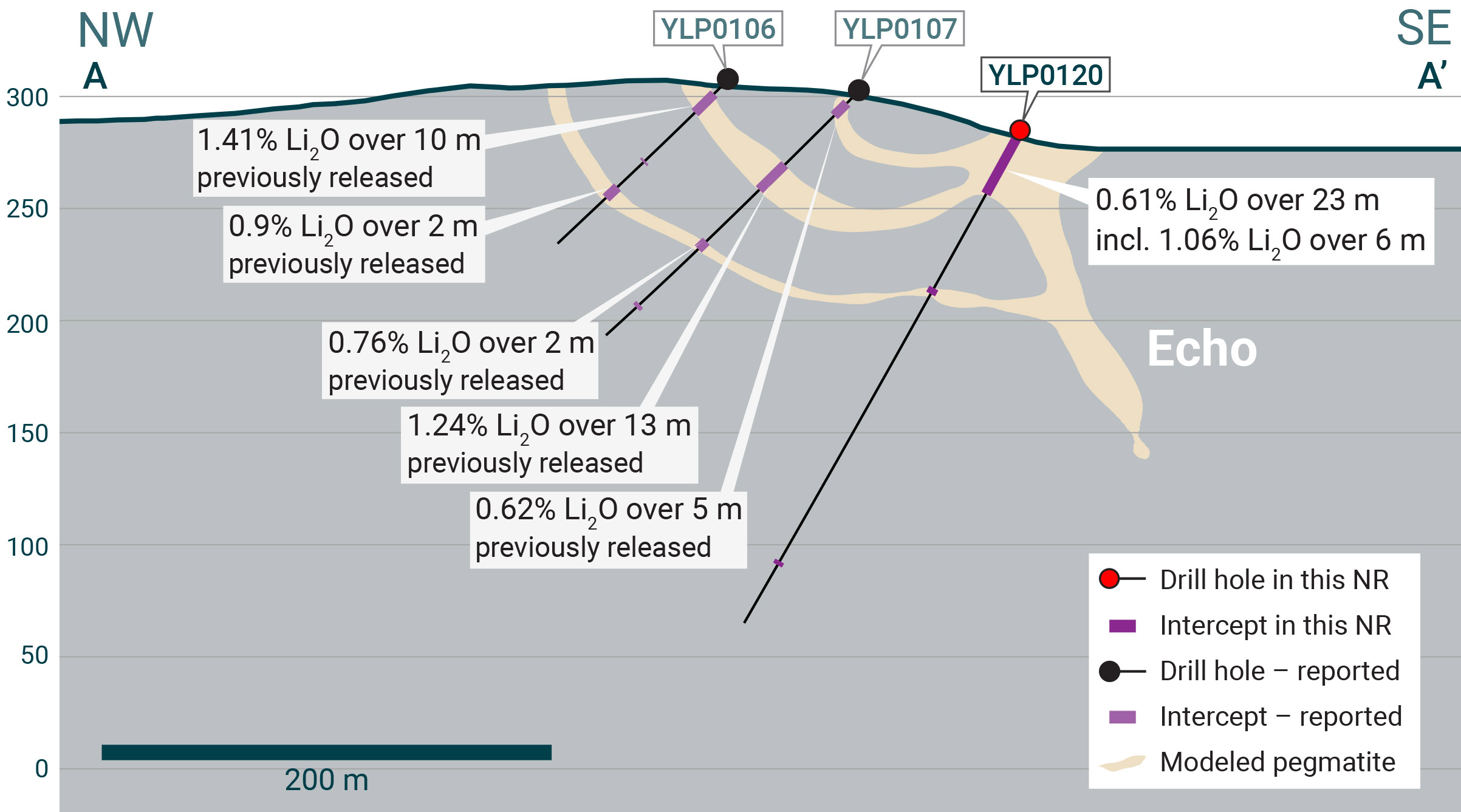
Figure 5 – Cross-section of YLP-0120 which intersected the Echo pegmatite dyke with a 23 m interval of 0.61% Li2O.
Shorty Pegmatite
The Shorty pegmatite is one of several dykes occurring within a north-of-northeast striking corridor. Drill intercepts of Shorty show that in some places it is formed by a single 10-25 m wide dyke whereas elsewhere it comprises 2-4 dykes with a similar cumulative width spread over 40-95 m of core length. The pegmatite is visible for at least 700 m on surface and dips 50°-70° to the west-northwest.
YLP-0070 was designed to test the Shorty pegmatite approximately 150 m from its southern mapped extent and 150 m vertically beneath the surface. Drilling intersected 31 m of pegmatite from three dykes spread over 70 m of drill core, with each dyke ranging between 9-13 m wide and returning negligible grade.
YLP-0111 was designed to test the Shorty pegmatite approximately 200 m from its northern mapped extent and 225 m vertically below the surface, as well as 100 m downdip of YLP-0103 (0.67% Li2O over 18 m) and 200 m downdip from YLP-0033 (1.13% Li2O over 25 m). Drilling intersected a 65 m interval with two thick (16-22 m wide) and two thin (1-2 m) dykes accumulating to 41 m of pegmatite. The lower-most of these dykes returned an assay composite of 0.52% Li2O over 11 m, including 1.24% Li2O over 2 m, whereas the other dykes returned negligible grade (Table 1 and 2, Figures 6 & 7).
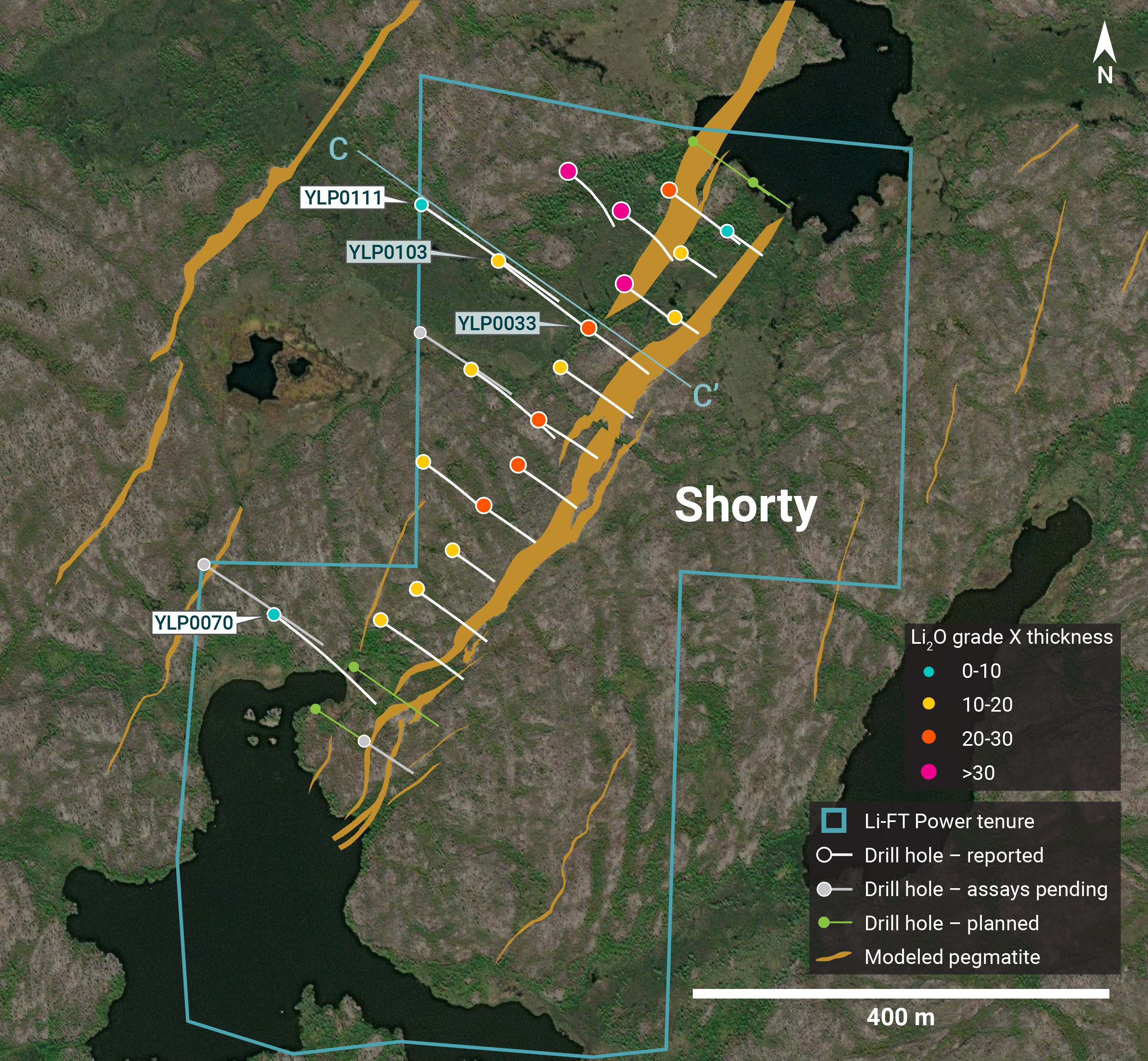
Figure 6 – Plan view showing the surface expression of the Shorty pegmatite with diamond drill holes reported in this press release.
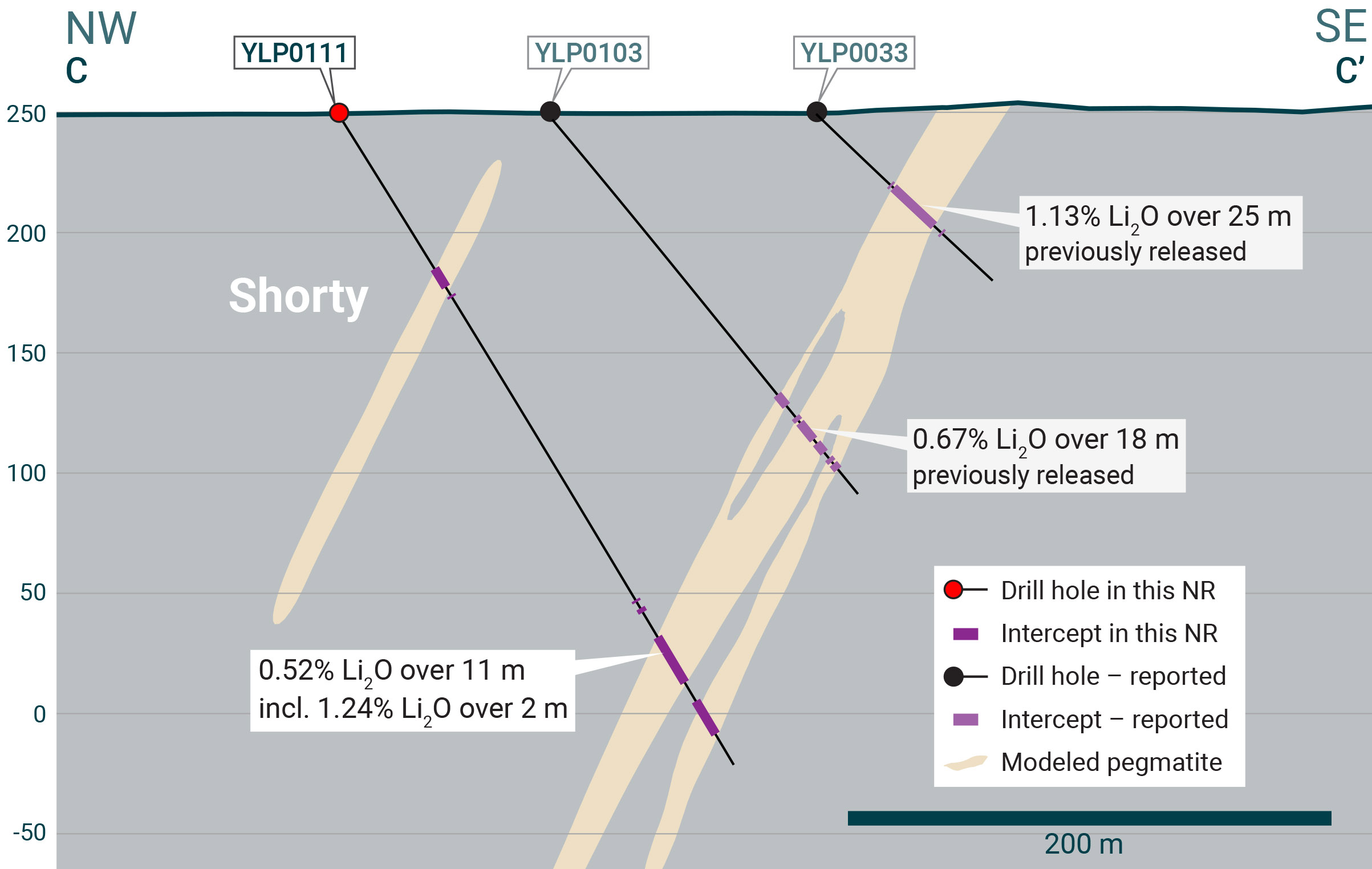
Figure 7 – Cross-section of YLP-0111 which intersected the Shorty pegmatite dyke with a 11 m interval of 0.52% Li2O.
Ki Pegmatite
The Ki pegmatite is one of several subparallel dykes occurring within a north-of-northwest trending corridor. Drill intercepts typically comprise a thick “main” dyke flanked by one or more narrower (1-5 m wide) dykes although, in places, it is formed by 2-6 dykes of similar cumulative thickness spread over up to 80 m of core length. The Ki dyke is visible for at least 1,000 m on surface and dips between 65°-80° to the southwest.
YLP-0118 tested the Ki pegmatite approximately 200 m from its southern mapped extents and 150 m vertically beneath the surface. Drilling intersected an 18 m wide main dyke flanked by a couple of 2 m wide dykes to the southwest, with the main dyke returning just one noteworthy assay of 0.96% Li2O over 1 m (Table 1 and 2, Figure 8).
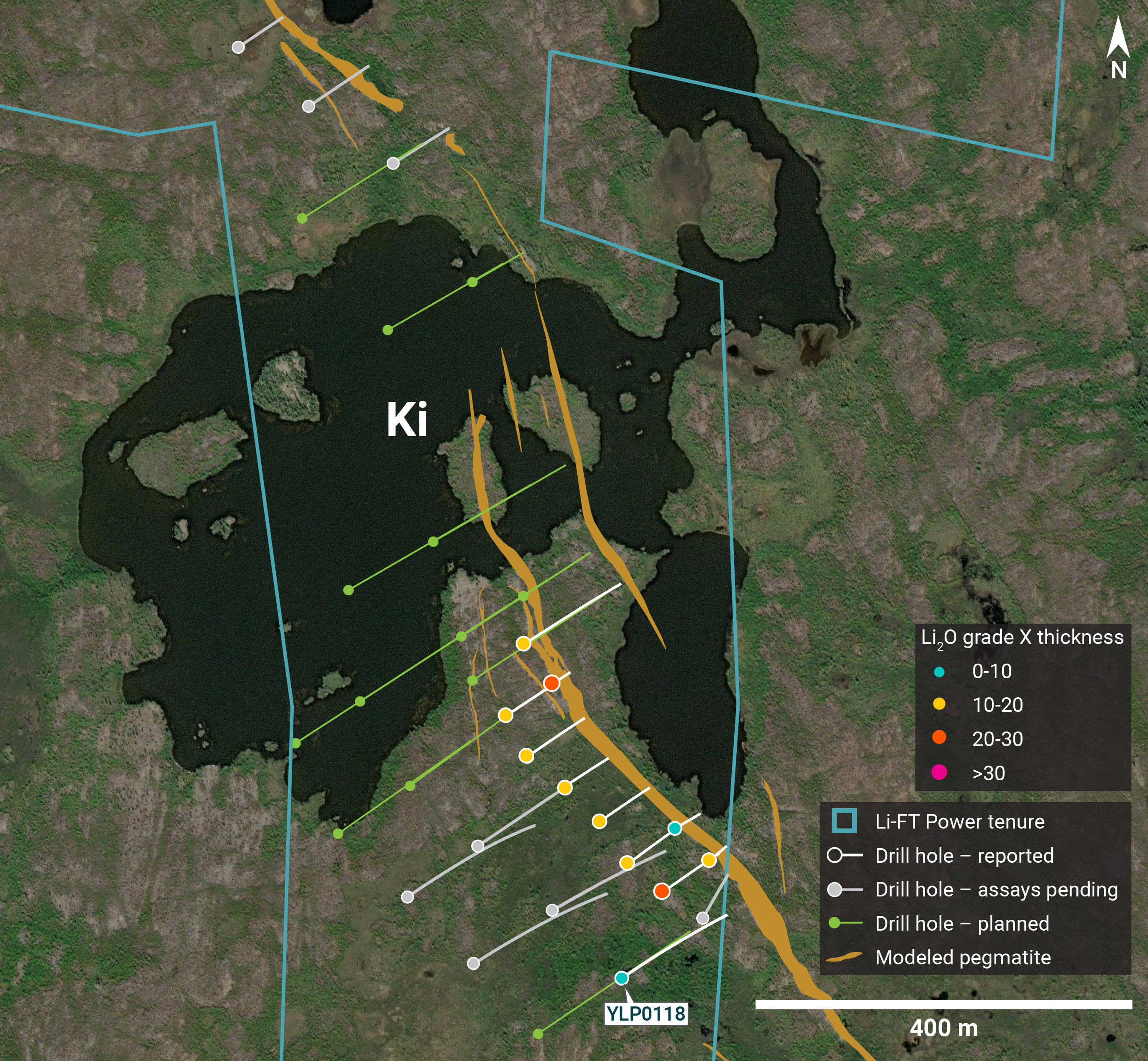
Figure 8 – Plan view showing the surface expression of the Ki pegmatite with diamond drill holes reported in this press release.
Fi Main Pegmatite
The Fi Main pegmatite comprises a 10-100 m wide corridor of 1-5 dykes that dip between 70°-85° to the west-northwest and extends for at least 1,500 m on surface.
YLP-0071 tested the Fi Main pegmatite just 100 m from its southern mapped extent and 50 m vertically below the surface. Drilling intersected a single 17 m wide pegmatite dyke that returned negligible grade.
YLP-0137 tested the Fi Main pegmatite approximately 650 m from its northern mapped extent and 200 m vertically beneath the surface, as well as 100 m downdip of YLP-0018 (combined 31 m of pegmatite averaging 0.54% Li2O) and 50 m up-dip of YLP-0019 (negligible grade). Drilling intersected three separate pegmatite swarms comprising summed totals of 24 m of pegmatite between 28-65 m core depth, 21 m between 226-252 m depth, and another 21 m between 311-346 m depth. All pegmatite returned negligible grade (Table 1 and 2, Figures 9 & 10).
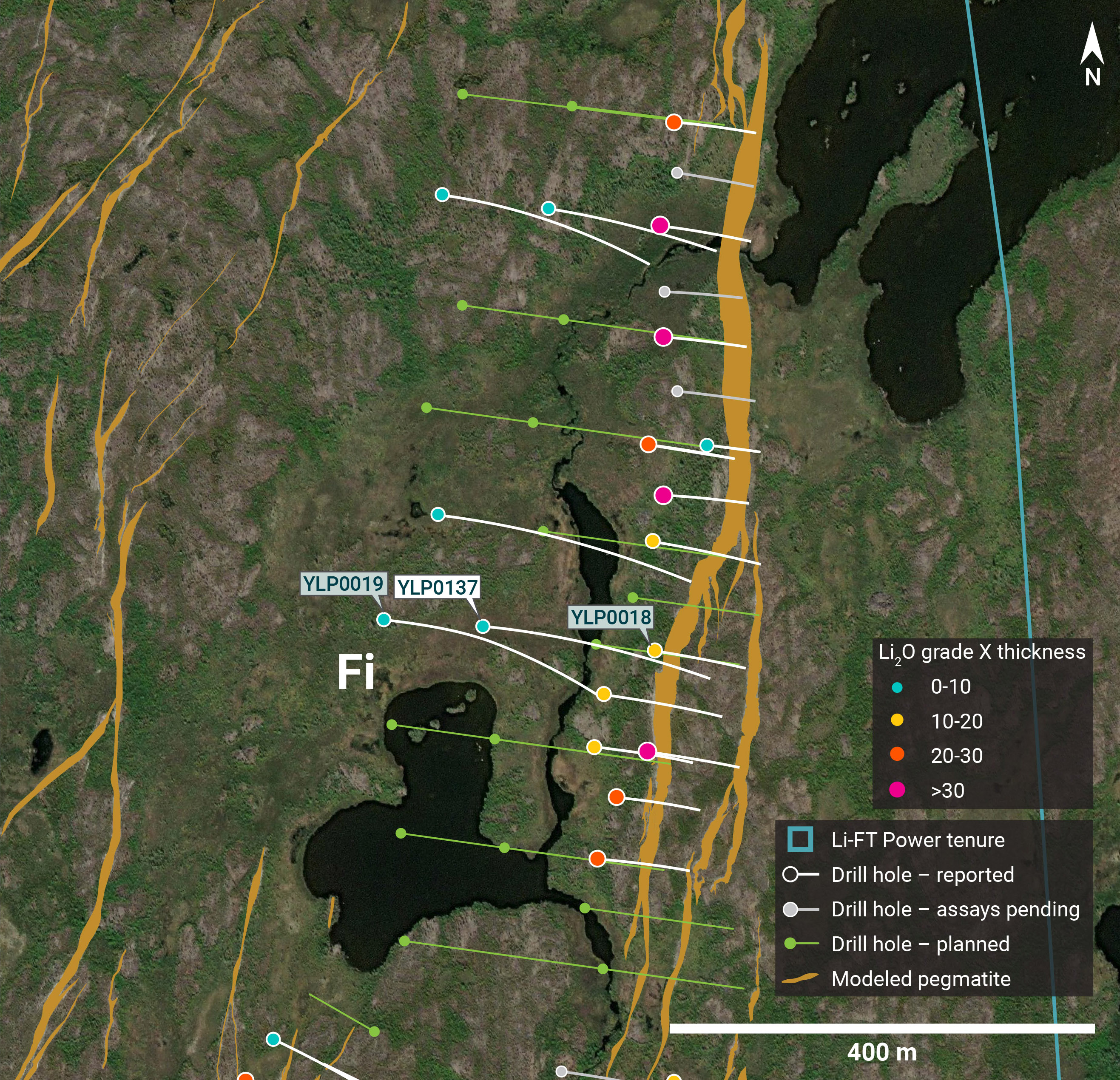
Figure 9 – Plan view showing the surface expression of the Fi Main pegmatite with diamond drill holes reported in this press release.
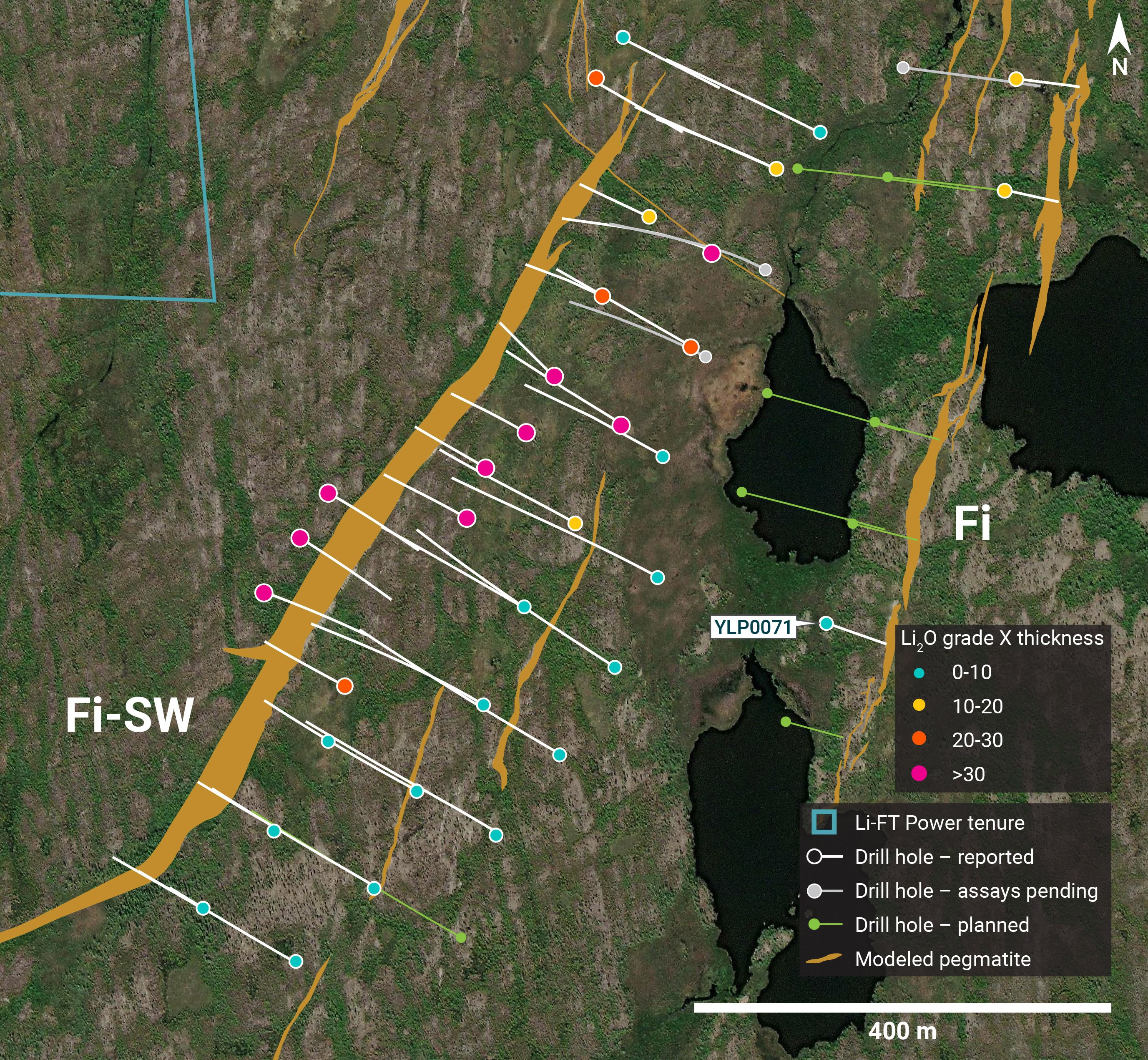
Figure 10 – Plan view showing the surface expression of the Fi SW pegmatite with diamond drill holes reported in this press release.
Table 1 – Assay highlights for drill holes reported in this press release.
| Hole No. | From (m) | To (m) | Interval (m) | Li2O% | Dyke |
| YLP0070 | No significant results | Shorty | |||
| YLP0071 | No significant results | Fi Main | |||
| YLP0111 inc |
288 | 299 | 11 | 0.52 | Shorty |
| 296 | 298 | 2 | 1.24 | Shorty | |
| YLP0115 inc |
253 | 281 | 28 | 0.99 | BIG East |
| 259 | 267 | 8 | 1.43 | BIG East | |
| YLP0118 | 202 | 203 | 1 | 0.96 | Ki |
| YLP0120 inc |
4 | 27 | 23 | 0.61 | Echo |
| 3 | 9 | 6 | 1.06 | Echo | |
| YLP0123 | 42 | 48 | 6 | 1.07 | BIG East |
| YLP0137 | No significant results | Fi Main | |||
Drilling Progress Update
The Company has concluded its 2023 drill program at the Yellowknife Lithium Project with 34,238 m completed. Currently, LIFT has reported results from 124 out of 198 diamond drill holes (21,853 m).
General Statements
All eight holes described in this news release were drilled broadly perpendicular to the dyke orientation so that the true thickness of reported intercepts will range somewhere between 65-100% of the drilled widths. A collar header table is provided below.
Mineralogical characterization for the YLP- pegmatites is in progress through hyperspectral core scanning and X-ray diffraction work. Visual core logging indicates that the predominant host mineral is spodumene.
Table 2 – Drill collars table of reported drill holes in this press release
| Drill Hole | Easting | Northing | Elevation (m) | Azimuth (°) | Dip (°) | Depth (m) | Dyke |
| YLP-0070 | 372,583 | 6,937,906 | 250 | 123 | 57 | 240 | Shorty |
| YLP-0071 | 371,612 | 6,940,599 | 249 | 105 | 45 | 84 | Fi Main |
| YLP-0111 | 372,724 | 6,938,298 | 250 | 124 | 58 | 318 | Shorty |
| YLP-0115 | 345,742 | 6,932,995 | 207 | 120 | 48 | 401 | BIG East |
| YLP-0118 | 373,172 | 6,942,534 | 257 | 56 | 55 | 228 | Ki |
| YLP-0120 | 439,291 | 6,922,724 | 285 | 215 | 62 | 252 | Echo |
| YLP-0123 | 346,277 | 6,934,002 | 213 | 122 | 45 | 101 | BIG East |
| YLP-0137 | 371,613 | 6,941,549 | 251 | 98 | 53 | 361 | Fi Main |
QAQC
All drill core samples were collected under the supervision of LIFT employees and contractors. Drill core was transported from the drill platform to the core processing facility where it was logged, photographed, and split by diamond saw prior to being sampled. Samples were then bagged, and blanks and certified reference materials were inserted at regular intervals. Field duplicates consisting of quarter-cut core samples were also included in the sample runs. Groups of samples were placed in large bags, sealed with numbered tags in order to maintain a chain-of-custody, and transported from LIFT’s core logging facility to ALS Labs (“ALS”) laboratory in Yellowknife, Northwest Territories.
Sample preparation and analytical work for this drill program were carried out by ALS. Samples were prepared for analysis according to ALS method CRU31: individual samples were crushed to 70% passing through 2 mm (10 mesh) screen; a 1,000-gram sub-sample was riffle split (SPL-21) and then pulverized (PUL-32) such that 85% passed through 75 micron (200 mesh) screen. A 0.2-gram sub-sample of the pulverized material was then dissolved in a sodium peroxide solution and analysed for lithium according to ALS method ME-ICP82b. Another 0.2-gram sub-sample of the pulverized material was analysed for 53 elements according to ALS method ME-MS89L. All results passed the QA/QC screening at the lab, all inserted standards and blanks returned results that were within acceptable limits.
Qualified Person
The disclosure in this news release of scientific and technical information regarding LIFT’s mineral properties has been reviewed and approved by Ron Voordouw, Ph.D., P.Geo., Partner, Director Geoscience, Equity Exploration Consultants Ltd., and a Qualified Person as defined by National Instrument 43-101 Standards of Disclosure for Mineral Projects (NI 43-101) and member in good standing with the Northwest Territories and Nunavut Association of Professional Engineers and Geoscientists (NAPEG) (Geologist Registration number: L5245).
About LIFT
LIFT is a mineral exploration company engaged in the acquisition, exploration, and development of lithium pegmatite projects located in Canada. The Company’s flagship project is the Yellowknife Lithium Project located in Northwest Territories, Canada. LIFT also holds three early-stage exploration properties in Quebec, Canada with excellent potential for the discovery of buried lithium pegmatites, as well as the Cali Project in Northwest Territories within the Little Nahanni Pegmatite Group.
For further information, please contact:
| Francis MacDonald Chief Executive Officer Tel: + 1.604.609.6185 Email: [email protected] Website: www.li-ft.com |
Daniel Gordon Investor Relations Tel: +1.604.609.6185 Email: [email protected] |
Cautionary Statement Regarding Forward-Looking Information
Certain statements included in this press release constitute forward-looking information or statements (collectively, “forward-looking statements”), including those identified by the expressions “anticipate”, “believe”, “plan”, “estimate”, “expect”, “intend”, “may”, “should” and similar expressions to the extent they relate to the Company or its management. The forward-looking statements are not historical facts but reflect current expectations regarding future results or events. This press release contains forward looking statements. These forward-looking statements and information reflect management’s current beliefs and are based on assumptions made by and information currently available to the company with respect to the matter described in this new release.
Forward-looking statements involve risks and uncertainties, which are based on current expectations as of the date of this release and subject to known and unknown risks and uncertainties that could cause actual results to differ materially from those expressed or implied by such statements. Additional information about these assumptions and risks and uncertainties is contained under “Risk Factors and Uncertainties” in the Company’s latest annual information form filed on March 30, 2023, which is available under the Company’s SEDAR+ profile at www.sedarplus.ca, and in other filings that the Company has made and may make with applicable securities authorities in the future. Forward-looking statements contained herein are made only as to the date of this press release and we undertake no obligation to update or revise any forward-looking statements whether as a result of new information, future events or otherwise, except as required by law. We caution investors not to place considerable reliance on the forward-looking statements contained in this press release.
Neither the TSX Venture Exchange nor its Regulation Services Provider (as that term is defined in the policies of the TSX Venture Exchange) accepts responsibility for the adequacy or accuracy of this news release.
Photos accompanying this announcement are available at:
https://www.globenewswire.com/NewsRoom/AttachmentNg/0503cddf-ca7a-4cac-bc2e-39f094510693
https://www.globenewswire.com/NewsRoom/AttachmentNg/ce717f02-f50f-40ec-acb9-bd534f0715b6
https://www.globenewswire.com/NewsRoom/AttachmentNg/5b4e3eca-7f56-43b0-a2b5-54a61c8a075d
https://www.globenewswire.com/NewsRoom/AttachmentNg/3c94bccd-ad03-42a2-adfc-f95d5dc6748b
https://www.globenewswire.com/NewsRoom/AttachmentNg/004d7924-4de6-46fd-900b-7412a31cb190
https://www.globenewswire.com/NewsRoom/AttachmentNg/15ee8800-b306-4a2d-b32b-d047395c798c
https://www.globenewswire.com/NewsRoom/AttachmentNg/1c832cef-317a-4a74-9e67-34bdc6a82ddf
https://www.globenewswire.com/NewsRoom/AttachmentNg/c9c17085-0400-43e3-9a34-c3918fb49c8f
https://www.globenewswire.com/NewsRoom/AttachmentNg/e7f19a75-7daf-4e84-a01a-4051182179fa
https://www.globenewswire.com/NewsRoom/AttachmentNg/73d0f47e-540d-484d-b1b1-112950433524

Bay Street News











